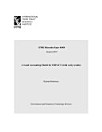Landscape complexity as determined by socioeconomic trends, climate change, and broad agricultural policies: A study on multifunctional landscapes
Cenacchi, Nicola · Petsakos, Athanasios · Robertson, Richard D. · Song, Chun · Mishra, Abhijeet
Jul 2025 · IFPRI Discussion Papers Buku 2343 · Intl Food Policy Res Inst
eBook
55
Halaman
family_home
Memenuhi syarat
info
reportRating dan ulasan tidak diverifikasi Pelajari Lebih Lanjut
Tentang eBook ini
Food systems face dire challenges, including climate change, biodiversity loss, and resource overuse. To ensure their long-term sustainability and resilience they need urgent transformation, while continuing to support livelihoods and address rising food insecurity. The design and management of multifunctional agricultural landscapes offer a pathway to address these challenges; and improved understanding of landscape complexity, including a diverse mix of natural and cropland covers, can help advance achievement of multiple food system goals. As land managers and decision makers plan for the future of our landscapes, they need to recognize that powerful forces outside their control will have a strong influence on the final outcome. This study explores the interplay between global drivers—such as population growth, economic trends, climate change—and landscape complexity, using a modeling system linking a global agricultural economic model to a land-use model. Global trends are described, and Kenya serves as a case study, representing broader local dynamics. Results indicate that the majority of agricultural landscapes, globally and in Kenya, are projected to experience increased complexity by 2050, primarily through cropland expansion at the expense of natural habitats. However, there are a few instances where an expansion in cropland may be liked to a decrease in landscape complexity. Patterns also vary under alternative scenarios of agricultural development. Where greater complexity is achieved through policies that further concentrate agricultural land in some areas, this is mainly associated with net gains in natural habitats and a contraction of cropland. Overall, this preliminary research underscores the need for integrated landscape management and more comprehensive scenarios to inform sustainable land-use planning aligned with global food security and environmental objectives.
Beri rating eBook ini
Sampaikan pendapat Anda.
Informasi bacaan
Smartphone dan tablet
Instal aplikasi Google Play Buku untuk Android dan iPad/iPhone. Aplikasi akan disinkronkan secara otomatis dengan akun Anda dan dapat diakses secara online maupun offline di mana saja.
Laptop dan komputer
Anda dapat mendengarkan buku audio yang dibeli di Google Play menggunakan browser web komputer.
eReader dan perangkat lainnya
Untuk membaca di perangkat e-ink seperti Kobo eReaders, Anda perlu mendownload file dan mentransfernya ke perangkat Anda. Ikuti petunjuk Pusat bantuan yang mendetail untuk mentransfer file ke eReaders yang didukung.








